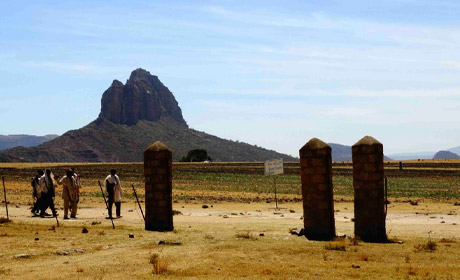IIED Director meets with Minister Sherlock
4/11/15
Farmers in the Tigray region, northern Ethiopia
Dr Andrew Norton, Director of the International Institute for Environment and Development (IIED), one of the world’s leading think tanks on climate change and development, is in Dublin today to meet with the Minister of State for Development, Trade Promotion and North-South Co-operation Séan Sherlock.
Dr Norton briefed the Minister on IIED’s work in partnership with Irish Aid, and they discussed preparations for a new global climate change agreement in advance of the United Nations Climate Change Conference in Paris, next December.
IIED has produced detailed studies on Irish Aid’s programmes in several African countries designed to adapt local agricultural, food and energy systems to the adverse effects of climate change.
In the Tigray region of Ethiopia, IIED’s work has concluded that climate variability is increasing and there are demonstrable trends towards increased temperatures, and risks to food production due to the failure of the short rains. However, Irish Aid work on soil and water conservation and improved varieties of crops and livestock has been very effective in creating better conditions for agriculture. In addition, well targeted social protection systems assist vulnerable communities to adapt to climate change in Sub-Saharan Africa.
IIED’s work in Irish Aid key partner countries in Africa has concluded that climate change has led to unpredictable rainfall patterns and increased temperatures
In Zambia, IIED undertook an assessment on the effects of climate change on the suitability of key crops (cassava, beans, sweet potatoes and groundnuts) highlighted in the Irish Aid local development plan for Northern Province, Zambia. The report found that decreases in the length of the rainy season are likely, with an increase in the number of very hot days.
The assessment found that cassava was the most resilient of the crops to climate change impacts such as temperature increases, while beans were the most vulnerable. The information will now allow Irish Aid and local partners to plan and adapt their climate action strategies accordingly.
In addition, IIED technical specialists and the Irish Aid Resilience Policy Team have developed an online “Climate Change and Development Learning Platform,” which links Irish Aid staff and partners to learn, share ideas and develop guidance on what works for poor people in the fight against climate change.
IIED and Irish Aid are jointly preparing guidance notes for Irish Aid programmes and partners on how best to integrate climate change into development programming, and to improve climate risk management across Irish Aid programmes
Find out more about the Climate Change Learning Platform:
http://www.climatelearningplatform.org/
Find out more about IIED’s work:

